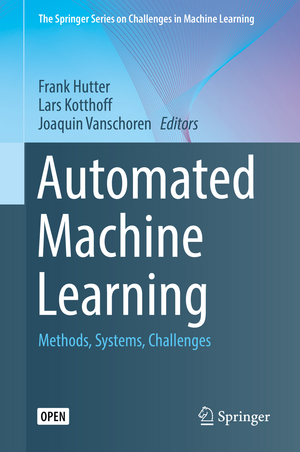Automated Machine Learning: Methods, Systems, Challenges: The Springer Series on Challenges in Machine Learning
Editat de Frank Hutter, Lars Kotthoff, Joaquin Vanschorenen Limba Engleză Hardback – 28 mai 2019
Preț: 306.88 lei
Preț vechi: 383.61 lei
-20% Nou
Puncte Express: 460
Preț estimativ în valută:
58.74€ • 63.83$ • 49.37£
58.74€ • 63.83$ • 49.37£
Carte disponibilă
Livrare economică 31 martie-14 aprilie
Livrare express 15-21 martie pentru 36.94 lei
Preluare comenzi: 021 569.72.76
Specificații
ISBN-13: 9783030053178
ISBN-10: 3030053172
Pagini: 242
Ilustrații: XIV, 219 p. 54 illus., 45 illus. in color.
Dimensiuni: 155 x 235 x 17 mm
Greutate: 0.61 kg
Ediția:1st ed. 2019
Editura: Springer International Publishing
Colecția Springer
Seria The Springer Series on Challenges in Machine Learning
Locul publicării:Cham, Switzerland
ISBN-10: 3030053172
Pagini: 242
Ilustrații: XIV, 219 p. 54 illus., 45 illus. in color.
Dimensiuni: 155 x 235 x 17 mm
Greutate: 0.61 kg
Ediția:1st ed. 2019
Editura: Springer International Publishing
Colecția Springer
Seria The Springer Series on Challenges in Machine Learning
Locul publicării:Cham, Switzerland
Cuprins
1 Hyperparameter Optimization.- 2 Meta-Learning.- 3 Neural Architecture Search.- 4 Auto-WEKA.- 5 Hyperopt-Sklearn.- 6 Auto-sklearn.- 7 Towards Automatically-Tuned Deep Neural Networks.- 8 TPOT.- 9 The Automatic Statistician.- 10 AutoML Challenges.
Recenzii
“This interesting collection should be useful for AutoML researchers seeking an overview and comprehensive bibliography.” (Anoop Malaviya, Computing Reviews, June 14, 2021)
Textul de pe ultima copertă
This open access book presents the first comprehensive overview of general methods in Automated Machine Learning (AutoML), collects descriptions of existing systems based on these methods, and discusses the first series of international challenges of AutoML systems. The recent success of commercial ML applications and the rapid growth of the field has created a high demand for off-the-shelf ML methods that can be used easily and without expert knowledge. However, many of the recent machine learning successes crucially rely on human experts, who manually select appropriate ML architectures (deep learning architectures or more traditional ML workflows) and their hyperparameters. To overcome this problem, the field of AutoML targets a progressive automation of machine learning, based on principles from optimization and machine learning itself. This book serves as a point of entry into this quickly-developing field for researchers and advanced students alike, as well as providing a reference for practitioners aiming to use AutoML in their work.
Caracteristici
Presents a tutorial-level overview of the methods underlying automatic machine learning, enabling readers to easily understand the key concepts behind AutoML Offers a comprehensive collection of in-depth descriptions of AutoML systems, allowing readers to see how the key concepts have been implemented in the context of actual systems Discusses an independent international competition of many different systems, providing an independent evaluation of pros and cons of different AutoML approaches







